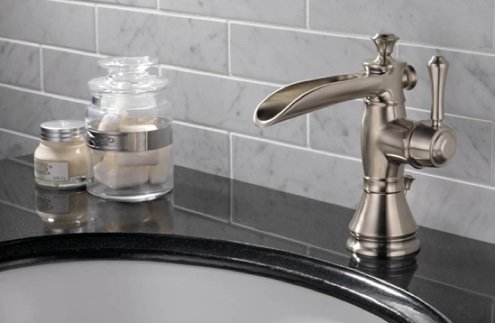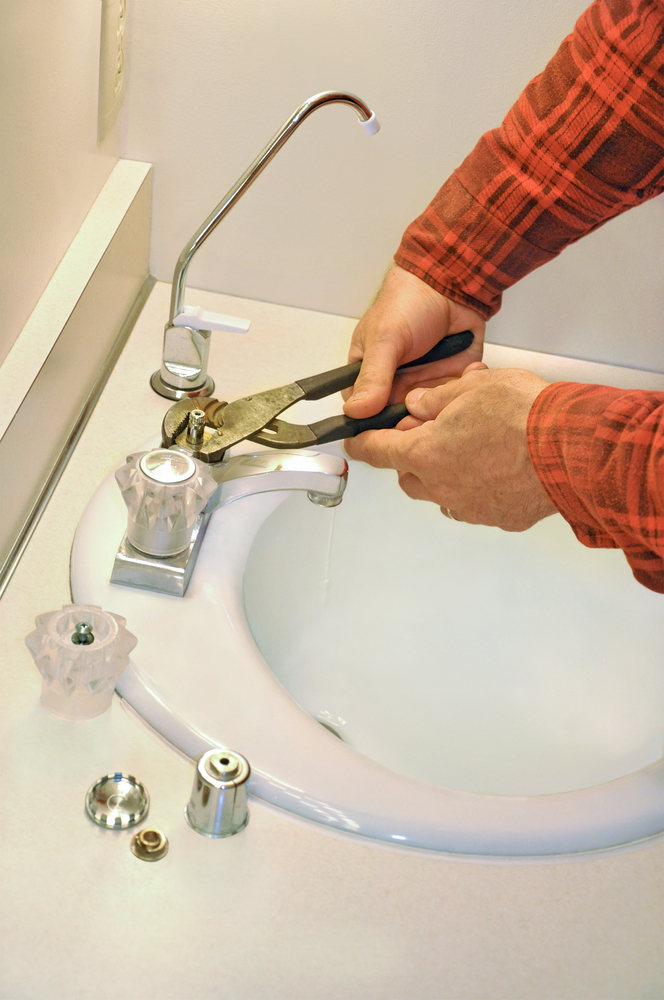We have stumbled on this post about Leaky Faucets: Why They Happen & What to Do About Them down the page on the internet and concluded it made good sense to talk about it with you in this article.

Trickling faucets may seem like a minor aggravation, but their effect surpasses simply the inconvenience of the sound. From wasting water to sustaining unnecessary financial costs and health risks, overlooking a trickling tap can lead to various consequences. In this write-up, we'll explore why it's important to address this usual home concern quickly and effectively.
Wastage of Water
Ecological Impact
Leaking taps contribute dramatically to water wastage. According to the Epa (EPA), a solitary faucet leaking at one drip per secondly can waste greater than 3,000 gallons of water per year. This not only stress water sources but also impacts ecological communities and wild animals dependent on them.
Financial Costs
Enhanced Water Expenses
Past the ecological influence, trickling taps can blow up water costs considerably. The gathered wastefulness with time converts into greater utility costs, which could have been stayed clear of with timely repairs.
Possible Building Damages
Furthermore, long term trickling can lead to damage to fixtures and surfaces bordering the tap. Water build-up can cause discoloration, rust, and even architectural concerns if left ignored, resulting in added repair work costs.
Health and wellness Issues
Mold And Mildew and Mildew Development
The continuous presence of wetness from a dripping tap creates a suitable environment for mold and mildew and mold development. These fungis not only endanger indoor air high quality yet also present health and wellness risks, particularly for people with respiratory system conditions or allergies.
Waterborne Conditions
Stagnant water in dripping taps can end up being a breeding ground for microorganisms and other pathogens, boosting the risk of waterborne conditions. Pollutants such as Legionella microorganisms flourish in stationary water, potentially bring about major illnesses when consumed or inhaled.
Do it yourself vs. Professional Repair service
Pros and Cons of DIY Fixing
While some may attempt to take care of a dripping faucet themselves, DIY repair services feature their own collection of obstacles. Without proper understanding and tools, do it yourself efforts can aggravate the concern or lead to incomplete repairs, prolonging the problem.
Benefits of Working With a Specialist Plumber
Employing an expert plumber makes sure that the underlying root cause of the leaking faucet is dealt with efficiently. Plumbings possess the knowledge and equipment to detect and fix tap problems efficiently, conserving time and lessening the risk of further damages.
Step-by-Step Guide to Dealing With a Dripping Tap
Tools Called for
Before trying to deal with a leaking tap, gather the essential tools, consisting of an adjustable wrench, screwdrivers, substitute parts (such as washing machines or cartridges), and plumber's tape.
Usual Faucet Issues and Their Solutions
Recognize the sort of faucet and the details issue creating the drip. Typical troubles consist of damaged washing machines, rusty shutoff seats, or defective O-rings. Describe manufacturer directions or on-line tutorials for step-by-step assistance on repair work.
Safety nets
Normal Upkeep Tips
To prevent dripping faucets, carry out routine upkeep such as cleansing aerators, evaluating for leakages, and changing damaged components promptly. Additionally, take into consideration mounting water-saving tools or updating to a lot more effective fixtures.
Significance of Prompt Repair Works
Dealing with dripping faucets as quickly as they're seen stops more water wastefulness and prospective damage, inevitably conserving both water and money in the long run.
Influence On Property Worth
Understanding of Well-Maintained Residential Or Commercial Property
Keeping a building in good condition, including addressing upkeep problems like trickling faucets, boosts its perceived worth and desirability among possible buyers or occupants.
Influence on Resale Value
Features with well-kept plumbing components, including faucets, command greater resale worths in the real estate market. Dealing with leaking taps can add to a positive impression during residential property inspections and negotiations.
Environmental Duty
Specific Payment to Preservation
Taking duty for dealing with trickling taps straightens with more comprehensive initiatives towards water preservation and environmental sustainability. Every individual's actions collectively make a significant impact on maintaining priceless sources.
Sustainable Living Practices
By prioritizing punctual repair services and embracing water-saving practices, people contribute to lasting living techniques that profit both existing and future generations.
Final thought
Attending to a dripping tap exceeds mere convenience; it's an essential action toward preserving water, decreasing monetary costs, and securing health and property. Whether with DIY repair services or professional support, doing something about it to repair leaking taps is a small yet impactful method to advertise liable stewardship of resources and add to a healthier, much more lasting future.
How to Fix a Leaky Faucet: Step-by-Step Repair Guide
A leaky faucet may seem like a simple annoyance, but if it's not fixed promptly, that leak could cost hundreds to potentially thousands. From water damage to mold, mildew, and high water bills, even a tiny leak can be catastrophic if left unattended. Damage like this can even affect the overall value of your home, so it's important to take the right approach for leaky faucet repair. You may need the help of a plumber in some cases, but we've got a few tips you can try on how to fix a leaky faucet before calling the pros.
Four Faucet Types
When you're learning how to fix a leaky faucet, the first step is knowing what kind of faucet you're working with! There are four common types.
Cartridge Faucets
Cartridge faucets come in one- or two-handled varieties. In one-handled cartridge faucets, hot and cold water combines in a single cartridge. In the two-handled versions, hot and cold water are controlled separately and mixed in the faucet.
Ball Faucets
Ball faucets have a single lever you push up and down to adjust the pressure and rotate to change the temperature. A slotted metal ball controls the amount of water allowed into the spout.
Compression Washer Faucets
They're the oldest type of faucet, but they're still used in many homes — especially older ones. Compression faucets have two separate handles that, when turned, raise or lower the washer that seals a water valve. This valve stops water from flowing through the faucet when it is turned off.
Disc Faucets
Disc faucets rarely need to be repaired due to their maintenance-free design. The water flow is controlled by two discs — the upper one raises and lowers against a fixed lower disc, creating a watertight seal. If your disc faucet starts leaking, you may need to replace the seals or clean residue buildup from the inlets.
Fixing a Leaky Faucet
Step 1: Turn Off the Water
Whether you're learning how to fix a leaky bathtub faucet or how to fix a leaky kitchen faucet, always turn off the water supply to your working area when you're fixing a leak. The last thing you want is a flood added to your list of things to fix.
Look for the shutoff valves below your sink or around the tub and turn them clockwise to stop the water flow. If your faucet doesn't have shutoff valves, you may need to turn off the water for the whole house. Check to make sure it's off by turning the faucet on. If nothing comes out, you're ready to start the repair.
Step 2: Take Apart the Faucet
How you disassemble your faucet depends on the type of fixture you have. You can use a flathead screwdriver to remove the caps on top of the handle or handles for cartridge and compression faucets. Inside, you should see handle screws. Unscrew these with a screwdriver to remove the handle.
Disc- and ball-style faucets will typically have an inlet screw near the handle, and removing that will reveal the interior of the faucet.
Detach the Valve Stem
For cartridge- and compression-style faucets, you'll see the inner valve stem or cartridge once you remove the faucet handles. If you have a compression faucet, unscrew the brass valve stem. If you have a cartridge faucet, pull out the cartridge. If your cartridge has been in place for a while, it may require some tools or extra force to remove it due to mineral deposits.
Examine and Replace Parts
Once you've removed the parts, check them out to confirm what needs to be replaced. You may see corroded rubber washers, O-rings, stems, or cartridges. On a ball-style faucet, check the seats and springs for damage.
If you need to repair a leaky disc faucet, check the inlet and seals on the lower disc.
Once you determine what parts must be replaced, visit your local hardware store. Bring the damaged parts with you to ensure you can purchase the correct components to replace them.
Clean Valves and Faucet Cavity
If you've removed a stem or cartridge, you may notice mineral buildup in the faucet's threads. Use white vinegar to clean the valve seat by soaking it for a few minutes, then scrub it away with a soft toothbrush and rinse with warm water. You can also clean the interior of the faucet in the same way.
Reassemble the Faucet
Once your faucet is cleaned and the required parts have been replaced, it's time to reassemble it. Put the pieces back together and slowly turn the water supply back on. Doing this slowly is crucial because too much initial water pressure can damage the new hardware you've just installed.
https://homewarranty.firstam.com/blog/how-to-fix-leaky-faucet

I have been very excited about Why It's Important to Fix Leaky Faucets and I really hope you appreciated the entire blog posting. Appreciated our blog? Please share it. Let somebody else find it. Many thanks for going through it.
Comments on “When It's Vital to Fix a Faulty Faucet”